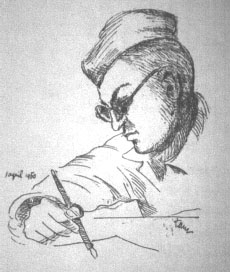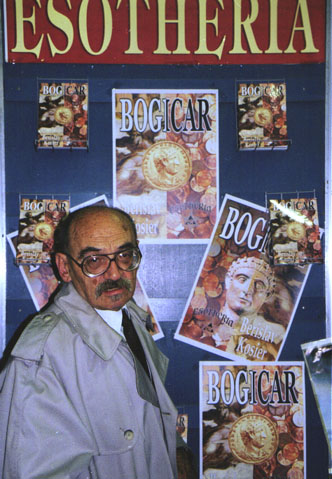

Berislav Kosier
Biography
Bibliography
About newest novel
Biography
Born 1930. in Belgrade. Yugoslav writer, author of prose, poetry, esseys and journalism. Political prisoner in his youth (Naked Island on the Adriatic sea); afterwards regarded as a constant intellectual dissident. He received over 20 domestic and international literary and dramatic awards, however there was not a single yugoslav "state" award among them. Up to now his literal works are tranlated on 12 foreign languages.

Bibliography
Novels:
Fair
wind, Blue bird
The
unique Icebreaker
The
Tree and the Eagle's claw
Buds
and Frost
Green
river - Red river
Comrade
Simon's Case
Brick
& co.
The
newly rich
White
deluge
The
glow of the Evening star
The
Godless Ones I-II-III (a trilogy)
A
brief course in acrobatism, equilibration and death leaps
God'n'Czar
Plays:
A
affable tarantule
A
worker's story
Dossiteus,
the Serbian Odysseus
Laza
Kostic the Poet

BERISLAV
KOSIER's
N
E W E S T N O V E L
published
in the edition Anima Mundi (Soul of the World)
GOD'N'CZAR
(BOGICAR)
Brief content:
Apolyd,
a young travelling Christian preacher in the first and second decade of the 4th
century, had already lived through many misfortunes:
incarceration, torture and partial crippling by the cruel authorities of the
Roman Empire in the Near East during the final persecution of Christians.
Ruphus
Decimus Kharon, an intelligent cynic and absolute master of Antioch and the
entire diocese of the Orient, indulged himself in a long-standing game of
"cat and mouse" with Apolyd. For
Kharon, Apolyd represented the new educated generation of Christians, and that
meant a greater threat to the Empire than their primitive predecessors.
Apolyd,
however, was deeply dissatisfied with the entire situation of the legal or
half-legal Christian communities, with their social position and with the
quality of their faith. He believed that they had abandoned the authentic principles
of Christianity. Therefore,
emulating the early Christian communities, Apolyd founded his own little
community that would spread God's true message - trough its poverty, simplicity,
righteousness and completely equality, as well as with its special individual
relationship with God.
A
huge historical turn of events had taken place and profoundly changed all the
ancient world! In 313 A.D. the czar
Constantine the Great, with his decree called The Edict of Milan, legalized
Christianity
What
would become of Apolyd and his ideals? Apolyd
secretly belief that he was parhaps the next Son of God, the successor to Jesus
from Nazareth. Would he try to
impose his own faith to the already established Church?
Or would he, infected by his new position, sink into the moral decay?
The
possible "key" od the novel GOD'N'CZAR might be found in the following
sentences:
Could anyone return the muddied water to its spring so that it would be clean and pure again? One always pays dearly for such an attempt, because the water refuses to flow backwards and the one who is attempting is only a feeble human being, suspectible to pain, decay, death.
And
so it goes in all times, since the world has existed. And until its end.